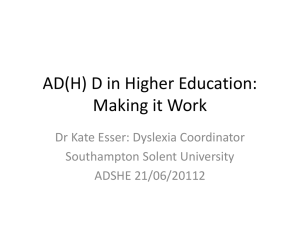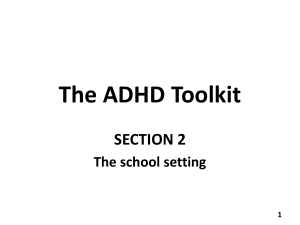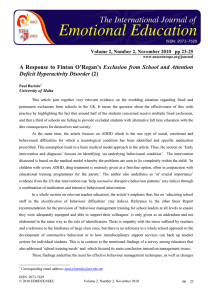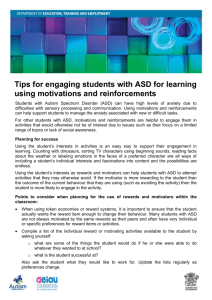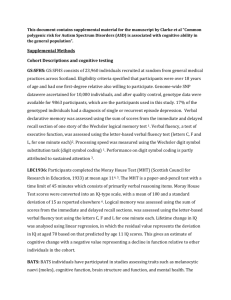File
advertisement
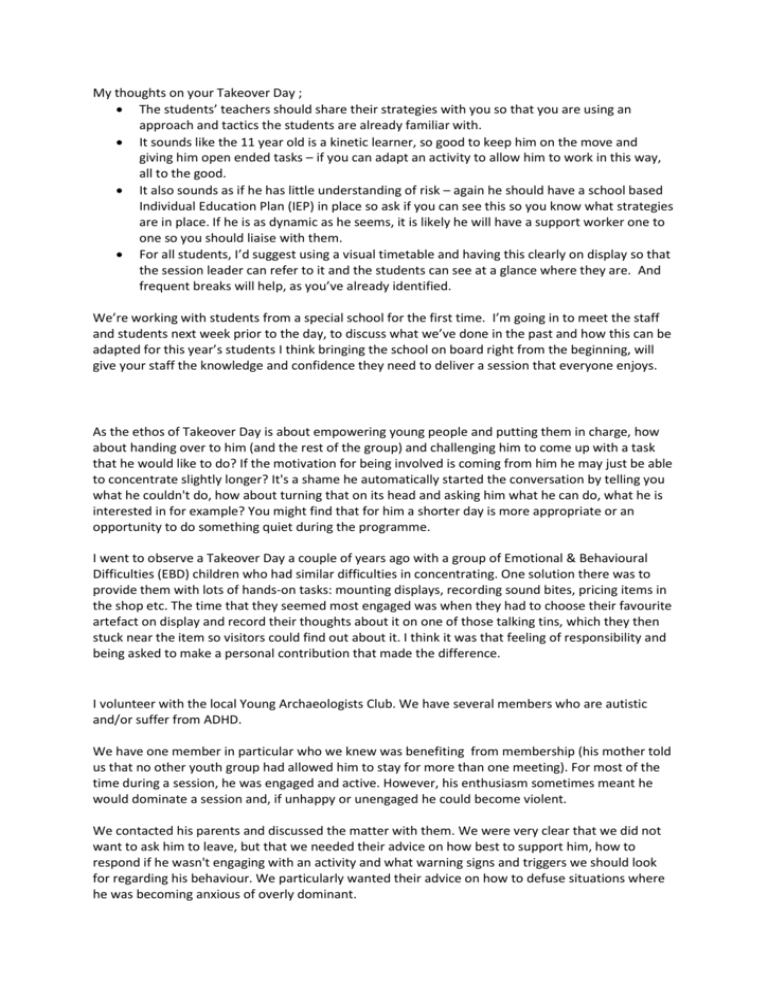
My thoughts on your Takeover Day ; The students’ teachers should share their strategies with you so that you are using an approach and tactics the students are already familiar with. It sounds like the 11 year old is a kinetic learner, so good to keep him on the move and giving him open ended tasks – if you can adapt an activity to allow him to work in this way, all to the good. It also sounds as if he has little understanding of risk – again he should have a school based Individual Education Plan (IEP) in place so ask if you can see this so you know what strategies are in place. If he is as dynamic as he seems, it is likely he will have a support worker one to one so you should liaise with them. For all students, I’d suggest using a visual timetable and having this clearly on display so that the session leader can refer to it and the students can see at a glance where they are. And frequent breaks will help, as you’ve already identified. We’re working with students from a special school for the first time. I’m going in to meet the staff and students next week prior to the day, to discuss what we’ve done in the past and how this can be adapted for this year’s students I think bringing the school on board right from the beginning, will give your staff the knowledge and confidence they need to deliver a session that everyone enjoys. As the ethos of Takeover Day is about empowering young people and putting them in charge, how about handing over to him (and the rest of the group) and challenging him to come up with a task that he would like to do? If the motivation for being involved is coming from him he may just be able to concentrate slightly longer? It's a shame he automatically started the conversation by telling you what he couldn't do, how about turning that on its head and asking him what he can do, what he is interested in for example? You might find that for him a shorter day is more appropriate or an opportunity to do something quiet during the programme. I went to observe a Takeover Day a couple of years ago with a group of Emotional & Behavioural Difficulties (EBD) children who had similar difficulties in concentrating. One solution there was to provide them with lots of hands-on tasks: mounting displays, recording sound bites, pricing items in the shop etc. The time that they seemed most engaged was when they had to choose their favourite artefact on display and record their thoughts about it on one of those talking tins, which they then stuck near the item so visitors could find out about it. I think it was that feeling of responsibility and being asked to make a personal contribution that made the difference. I volunteer with the local Young Archaeologists Club. We have several members who are autistic and/or suffer from ADHD. We have one member in particular who we knew was benefiting from membership (his mother told us that no other youth group had allowed him to stay for more than one meeting). For most of the time during a session, he was engaged and active. However, his enthusiasm sometimes meant he would dominate a session and, if unhappy or unengaged he could become violent. We contacted his parents and discussed the matter with them. We were very clear that we did not want to ask him to leave, but that we needed their advice on how best to support him, how to respond if he wasn't engaging with an activity and what warning signs and triggers we should look for regarding his behaviour. We particularly wanted their advice on how to defuse situations where he was becoming anxious of overly dominant. The solution we settled upon was for his father to come along to the session as an additional helper. The child in question has responded really positively. He likes having his dad there as an adult he knows and is comfortable with. It also means that he can receive the one-to-one support he needs without it negatively impacting on the other children I'm not in any way saying that this is the best solution in every case. It works for him. What I would advocate is involving the family in finding the right solution for you. I thought I’d write back as I used to teach a lot of special needs children when I was teaching in schools. My best advice would be to speak to the school and find out what provisions are made for him there. Does he have a 1:1 teaching assistant (TA)? If so can you replicate this or have the TA in with him on the day? Is there a points system or a record book he has where his good behaviour is recorded? As you say you will not have time in your project to set up a new routine and you are almost certainly right that just being in a different environment could create complications. What you need to do is carry through exactly the same treatment as at school – the same rules, the same rewards, the same consequences. This will at least give some consistency in the new environment and hopefully help calm behaviour with this familiarity. If there is no support or rewards system in the school for you to emulate (unlikely but possible) then a rewards system of some kind is always of benefit e.g. stickers in a book for completing each of your 30 minute segments safely. Your idea of cards is a good one – you could call them expectations or behaviour cards. Make a set of cards and put them on a wrist band/lanyard so that your ADHD child can wear them/be in charge of them, but make sure to include the whole group too in the behaviours discussion too so there is no obvious difference between the way you are treating the children. Make sure the cards are simple so that you can ask questions like ‘which one of the cards shows best how you should be behaving now?’. If you are moving around a lot get the group to choose a behaviour card before you move to a new location. For example, say you are going to look at a case in the exhibition but there might be other people in the space. Ask the children which behaviour card is the most important at the time e.g. ‘walk don’t run’, or ‘talk in whispers’, or ‘respect others’. With your ADHD child in charge of the cards hopefully he will feel a bit of responsibility, which could help with focus. N.B do not put your cards on anything springy – chaos will ensue! The fact that the boy is aware of his behaviour is both a good and a challenging thing for you. It may be hard for you to determine whether his behaviour with you is driven by his ADHD or if he is just very aware of how to ‘mimic’ his own behaviour to cause disruption at other times e.g. when he wants to be the centre of attention. If he has chosen to be on your project though this probably won’t be too much of an issue. Again I’d refer to the school support system, to TAs who know him well, and find out what level of concentration and behaviour you should expect of him. If you do have any children on the spectrum you just need to be aware that it is likely they will take everything you say literally. Keep your instructions clear and without inference. For any further events I can’t recommend enough close contact with the child’s parents and school. I think it’s great that you’ve moved to a different audience for Takeover Day –you will be able to add value for the children with additional needs where the opportunities for them to do things are often rare. Hopefully you’ll have a great time and you’ll have a brand new audience to work with. As with all SEN teaching you will make many mistakes but there really is no substitute for experience. Every child is unique and that is even more true (if that’s possible!) with SEN. I would suggest if you're unsure at all speak to some people who know each child very well. In a school context it might be their form teacher if they're secondary school, or class teacher at primary. Don't be disheartened if the class teacher passes you on to a teaching assistant - sometimes they spend much more one to one time with a child and are the better person to talk to in this context. If they are diagnosed formally as having ASD (autism spectrum disorder) or ADHD they may also have an individual support person 'attached' to them as part of their school package - in which case that's the person to talk to. In fact if they are diagnosed and funded for having a person assigned to them for one to one support, I would argue that person should be with them during their take over day too - though that could be a tough battle to fight with the school as what should happen in theory and what does happen in reality aren't always the same thing. But it's worth at least asking the school about who knows him best, who is their closest support person, and if they receive one to one support. Also I would go a step further and see if you can talk to a parent / carer / family member if that's appropriate. It will be extra work for you but no-one knows what makes that child switch on / off, what interests and engages them, and what will disengage them like their closest family member. They will probably drop in other very useful bits of info in conversation such as any special interests, or things they are especially sensitive about. All the parents I know with kids with either of these conditions would be so happy that anyone cares enough to ask them about their child and would not at all be offended, certainly for a child who has a diagnosed condition, though of course all families are different. With the girl, if she does not have a formal diagnosis you will need to tread very carefully of course. Talk to the main school contact for the project in the first instance and say that you have noticed particular differences between her and her peers, and ask what they know about any particular needs or abilities she does or doesn't have. If it's possible practically, you might find it more manageable to have them each working in a different group / space, as their particular needs might bounce off one another and heighten their collective energy / difficulties if they're all working closely together. And try and keep a friend of their choosing with them, so they feel safe. Also as much as you can, spend a bit of time with the children themselves and find out as much as you can about them, maybe see if you can lead them into spaces and just see what they're attracted to - follow and observe them for a while and see what sparks their interest, and then see if that can be built into their experience. Some quick tips with ASD which you might find useful - Often ASD children don't make eye contact, so don't press them for it and don't assume they're not listening. - Side by side conversation can be more effective than face to face - Often visual communication can be easier for them than spoken language - both in terms of you communicating with them and vice versa. - Sometimes gestures are easier than words eg thumbs up or down rather than asking them for a yes or no; and asking them to take you to something that interests them as they may not naturally point. - ASD people can really struggle with nuances of language so short and simple with no hidden meaning is massively helpful. I think this is really important in the context of museums where so much of our lexicon exists through metaphor. Just say what you mean. - Prompts are very helpful for ASD people also: eg 'In 1 minute we will finish X and then we will move to Y space to start Z' - as it helps them understand a change (and possibly movement) is coming, which can be unsettling for them if it comes out of the blue (also if they're on a roll talking about something that fascinates them it helps them understand they have to stop talking!) And then follow it up with 'It's now time to stop X. We are now moving to Y space to start Z' - Provide them with a fidget thing - does the museum shop do rubber wristbands? If so could you give them one each? Having something small, portable and tactile can help them focus their physical energy and any anxiety, freeing them up to focus on the task in hand (Obviously you may want to think about whether to give all the pupils involved one so as not to single them out; but if the cost implications of that aren't viable; it's likely their peers will be used to the diagnosed pupils having some different things going on so it's not the end of the world - best to take a teacher's advice on this one). I’m certainly not an expert but it sounds like you need a staff member or volunteer with specific experience to be attached to the sessions, to unobtrusively support him particularly. At school, depending on his special needs statement, he could have a Teaching Assistant with him either all or part of the time- could his parents set you up with a quick phone call to the TA or teacher for some steer on the rules and codes he normally follows? It might be that there are shorthand rules and routines that you can lift straight from school to use in the museum learning context, rather than trying to add your own on. Formal or informal links to people with experience supporting people with ADHD or other similar circumstances could maybe help you find someone who could volunteer to accompany the sessions. I know that may be wishful thinking for a long term project! Maybe the local council (who surely have to input on provision for young people with disabilities) have an advisor you could speak with?

